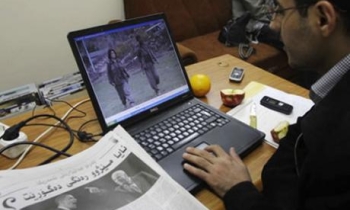Hiring bodyguards is standard fare for anyone in a high-profile position in Russia, but when American journalist Paul Klebnikov arrived in Moscow in 2004 to become editor of the Russian-language edition of Forbes magazine, he decided against it.
Klebnikov, 41, believed Russia had changed, that the free-for-all days of the 1990s were over. He told friends and family that having a bodyguard seemed "over the top."
So, when he left Forbes' Moscow offices at 10 p.m. on July 9, 2004, he did so alone. He walked a couple of blocks toward a subway station before a dark Lada with tinted windows veered sharply to the left and cut him off.
The driver rolled down the window and opened fire with a 9-millimetre Makarov pistol. Klebnikov was hit eight times. He survived for at least half an hour – long enough to be taken to a hospital – but died in a jammed elevator on his way to surgery.
Even in a city with more than its share of contract killings, Klebnikov's murder came as a shock. The unprecedented killing of a Western journalist was deeply embarrassing for President Vladimir Putin, who had vowed to bring stability to Russia's political and business circles.
Klebnikov's family and the U.S. government urged swift action, saying the killing sent a dangerous message about press freedom in Russia.
On Nov. 29, 2004, two Chechen men, Kazbek Dukuzov and Musa Vakhayev, were arrested in the Belarusian capital Minsk, where they allegedly fled after the killing.
They were returned to Russia and charged with the murder, along with Moscow lawyer Fail Sadretdinov, who'd allegedly arranged the hit on the orders of Kozh-Akhmed Nukhayev, a prominent Chechen separatist and the subject of a critical book by Klebnikov titled Conversations with a Barbarian.
Their trial finally began on Jan. 10, with prosecutors alleging the men were killers for hire. They have also been charged in the murder of former Chechen deputy prime minister Yan Sergunin and the attempted murder of a Moscow businessman. All three have pleaded not guilty. After a few days of hearings this month, the trial was suspended due to the ill health of the presiding judge and no date has been set for it to resume – behind closed doors.
Many of Klebnikov's friends and colleagues are dismayed that the trial will not be held in open court and they're concerned that prosecutors don't seem to be following up on a number of other possible leads.
Alexei Brevnov, the Klebnikov family's representative in Moscow, says the family was deeply disappointed by the court's insistence that the proceedings be held in secret. Prosecutors argued that the trial had to be closed to the public in order to protect the methods used to track down the defendants.
"Paul's life was dedicated to making Russia more open and transparent and this would have been the perfect opportunity to show that openness matters," says Brevnov. "Paul's family argued to Russian authorities that this trial had to be open, but they were refused."
The move has led to suspicions that the evidence linking the accused to Klebnikov's killing is tenuous and some critics suspect investigators may have rushed to charge the three men in order to bring the investigation to a close as soon as possible.
"I have all indications that there is an excellent team of investigators on this case, but there's a lot of pressure on them and I believe there was pressure in making the announcement that Nukhayev was the mastermind," says Richard Behar, a New York-based investigative reporter who is heading up Project Klebnikov, an alliance of journalists investigating the killing.
"I don't think they are pursing too many possible leads other than Nukhayev as the mastermind, but there are at least four or five other possible threads."
In more than a decade of delving into the murky world of Russian business and politics, Klebnikov had racked up a long list of potential enemies.
Descended from aristocrats who fled the Bolshevik revolt of 1917, Klebnikov grew up in New York City's Russian émigré community.
He took a job at Forbes in 1989 and, after the collapse of the Soviet Union in 1991, made regular trips to Russia to write about the enormous changes taking place in his family's homeland.
Klebnikov told some family members and colleagues shortly before his death that he had received documents containing extremely sensitive information. He did not reveal any details and the documents have never been found.
"I think he was killed because he went too far in some of his investigations that had not yet been published," says Alexander Gordeyev, the deputy editor of the Russian-language edition of Newsweek.
Gordeyev, the last person to speak to Klebnikov before his death, has also been critical of prosecutors for ignoring Klebnikov's dying words – that he was killed by a man of Russian appearance, not someone from the Caucasus region, where Chechnya is located.
"He told me as he lay there dying that it was a Russian man," Gordeyev says. "I asked him: `Could it have been a Caucasian?' He said no, it was a Russian."
Trying to unravel all these threads hasn't been easy, says Behar of Project Klebnikov, which involves more than 20 journalists in the United States and Russia.
Behar, who has reported for Time and Fortune magazines and worked with Klebnikov in the late 1980s, says the project operates as a kind of "virtual bureau" allowing journalists to share background information, documents and leads. He says the alliance is following up on a number of possible leads but that it's too early to go into details.
If Klebnikov were still alive, he says, this is exactly the kind of project he would have sunk his teeth into.
"It dawned on me after we launched this – it hit me that the best guy for this project would have been Paul. He would have been all over this. We miss him and we could really use his help."









